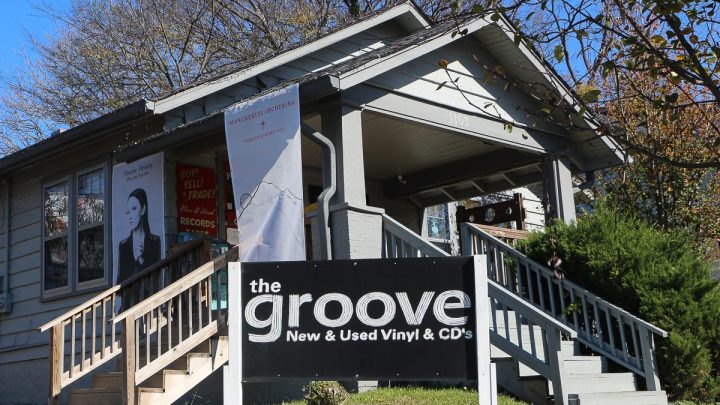
Hot property market puts Nashville record shop, and other small businesses, at risk
Hot property market puts Nashville record shop, and other small businesses, at risk

The Groove is a small record shop nestled into a 1920s Craftsman-style house in east Nashville, Tennessee.
“The whole personality of having the house is having a creaky door,” said co-owner Jesse Cartwright, “so we know when people come in.”
Inside, racks of vinyl records lined the walls, which were plastered with band posters and black-and-white photos from punk shows. Cartwright straightened a few albums perched above the fireplace.
“It’s just like being in your best friend’s house, looking through records,” he said.
Beyond being homey, the Groove has built a reputation for being a community space. It puts on concerts with bands — often before they get big — like Alabama Shakes and the singer Yola. In the fall, it hosts scary movie nights with a projector in the backyard.
But the Groove is in jeopardy; its landlord is selling the property.
Fortunately, part of the lease agreement gives the Groove’s owners an opportunity to buy the building before it hits Nashville’s competitive real estate market. Unfortunately, the price tag is nearly $500,000.
“People say it’s a good price point for Nashville, and I agree,” Cartwright said. “But for a small business, it’s a lot.”
Cartwright’s husband and co-owner of the Groove, Michael Combs, jumped in. “We don’t have half a million dollars just lying around in the bank. I wish we did, but we don’t.”

Combs said they’d need to raise the funds by the end of January, and this massive expense comes at a precarious time for the business.
On one hand, vinyl is more popular than ever before. Sales have skyrocketed.
“But the supply chain is rocky right now,” Combs said. “And they’re having trouble actually sourcing vinyl. So that also causes prices to go up.”
In turn, profit margins are down.
Plus, indie record shops like theirs aren’t the only ones in on the action.
“There’s a lot more competition because stores that never gave a hoo about vinyl, like Target and Best Buy and Amazon — there’s no CDs anymore, but they have vinyl sections,” Combs said.

These factors make the building’s price tag feel even more unattainable.
What’s happening to the Groove is becoming a familiar tale in Nashville, especially among independent music-related businesses.
For example, beloved venue Exit/In made a similar bid to gain ownership of its space through crowdfunding earlier this year. Despite those efforts, the building was sold to a developer.
Luckily, that developer said it has no plans to knock the place down, so it’s business as usual for the rock club.
But standing outside the Groove, Jesse Cartwright said he fears their building wouldn’t be so lucky.
“If we don’t purchase it, as soon as it’s purchased it will be bulldozed,” he said.
All around Nashville, small, old houses just like this one are being bought up and torn down. Sometimes, multiple modular-looking houses or mixed-use buildings are squeezed onto one lot.
Cartwright said that type of cookie-cutter development doesn’t match up with Nashville’s culture.
“We can have progress, we can make a hot city, without destroying everything that makes Music City Music City,” he said.
Nashville is growing fast, and Cartwright hopes that businesses like his won’t be left behind.
There’s a lot happening in the world. Through it all, Marketplace is here for you.
You rely on Marketplace to break down the world’s events and tell you how it affects you in a fact-based, approachable way. We rely on your financial support to keep making that possible.
Your donation today powers the independent journalism that you rely on. For just $5/month, you can help sustain Marketplace so we can keep reporting on the things that matter to you.











